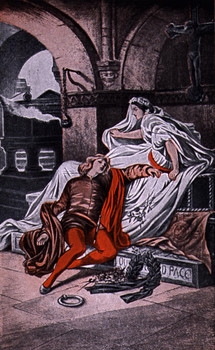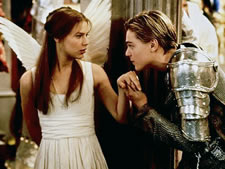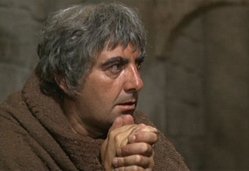Lesson 5.3A: Choices and Consequences
So what's it all about? What is Shakespeare really up to when he gives us the story in a nutshell in the prologue, before we've even started reading the play?
Think back to the prologue. Shakespeare gives us the basic story of Romeo and Juliet. Here's what he tells us:
- the Capulets and Montagues, two powerful families are bitter enemies
- their hatred comes between the love two of their children (Romeo and Juliet) have for each other
- Romeo and Juliet's love is doomed from the start
- the young lovers are forced to desperate actions that bring about their deaths
Why a plot summary in 14 lines before the play even begins? Shakespeare isn't so much concerned about what happens, but rather how it happens and why it happens.
 The Tragedy of It All The Tragedy of It All
Shakespeare wrote the story of Romeo and Juliet as a tragedy. But what does the word tragedy mean?
You might think of something very sad, perhaps a disaster of some kind where there was suffering or death. You might feel sympathy for the people involved in this event. You might wonder how something like this could happen. You might even feel thankful it didn't happen to you, and thankful you weren't involved.
Tragedy can also be defined as an event that causes great suffering, destruction and distress, such as a serious accident, crime, or natural catastrophe. In short, a tragic event has a sad or unfortunate outcome.
Shakespeare understood tragedy in a slightly different way. For him, and for others who wrote plays in Elizabethan times, tragedy has the effect of being both sad and uplifting. Shakespeare wants us to feel for them as we watch Romeo and Juliet ride waves of passion and sorrow. We watch them die in the end. In many ways, we feel helpless as we watch the events of the play unfold. We know what's going to happen, we see it coming, but we can't do anything about it. By the end, however, we have a better understanding as to how this all happened, along with why it happened.
Some see Shakespeare's exploration of character in Romeo and Juliet to be very important. The fact that Shakespeare's characters wrestle with choices, and that these choices end up having such a dramatic impact on the events that unfold in the play, is more important than what happens in the play itself.
This is what's important to Shakespeare - characters who act and feel and behave as we might.
 Character Flaws Character Flaws
While we might feel a sense of pity and sorrow at the deaths of Romeo and Juliet, we also need to understand that both characters have their flaws and shortcomings. Both make choices, and those choices and subsequent actions have consequences. At the same time, we can't ignore the fact that Romeo and Juliet are just normal young people with ordinary instincts and behaviours. In many ways, Romeo and Juliet are two teenagers trying to figure their way through a situation that is brand new to both of them. There is the exhilaration of falling in love, as well as the realization that this is a dangerous game they're playing. Lurking in the background is always the feud between their two families, the Capulets and the Montagues.
Ultimately, neither Romeo nor Juliet fully understands the impact of their love on those around them. Neither is equipped well enough to deal with this situation. We can see in Romeo and Juliet a refusal to live in the “real world” of Verona and obey the rules put before them. Because of their youth, impulsiveness, and ignorance, others are victims of their “star-cross'd” love.
Romeo and Juliet also contribute to their own tragic end. Their character flaws, along with the choices they make, bring this tragedy about.

Journal Entry 5.3A: The Biggest Choice of All
Of all the choices Romeo and Juliet made in this play, which one affected the outcome the most? Identify the choice, the impact it had, and the result of that choice.
|
Conflict: Wisdom versus Youth - Which is the Wiser?
The choices Romeo and Juliet make have an effect on others in the play. You explored the cost of these decisions in the previous guided practice.
Romeo and Juliet are also the victims of the faults of others, notably those of the adults who should be looking after them. Juliet's parents, Lord and Lady Capulet, the Nurse, Friar Laurence, and others all play a part in this tragedy. Their actions, or inactions, in various events influence the outcome of the play.
Here are two examples:
Capulet, Juliet’s father:
- Capulet meets with Paris at the beginning of the play. Paris has asked to marry Juliet, but Capulet says that Paris should proceed slowly, that Juliet is still young. Capulet speaks fondly of his daughter.
- Tybalt dies and there is a change in Capulet's character.
- Now he wants Juliet's marriage to Paris to happen very quickly.
- When Juliet refuses, he is ready to disown her.
- Juliet is forced to make a frantic decision to avoid marrying Paris.
 Friar Laurence: Friar Laurence:
- Friar Laurence is presented as a wise man, a peacemaker. When he hears of Romeo's love for Juliet and plans to marry her, Friar Laurence sees an opportunity for this wedding to bring an end to the family feud.
- The Friar is quick to help both Romeo and Juliet, whether it's with their secret marriage, or the plan to bring Romeo back to Verona after he's banished to Mantua for Tybalt's murder.
- As the play progresses, his plans become more desperate. Juliet is forced to drink a potion that will give her the appearance of death. As a result, Romeo is forced to return to Verona thinking she's dead.
- Once he arrives at Capulet's tomb to get Juliet, he sees first Paris, and then Romeo, dead. He tries to quickly get Juliet out of the tomb when she awakes. He fears for himself and what will happen if he's caught, so he flees the tomb.
- Juliet is once again forced to make a frantic decision that results in her death.
Both Lord Capulet and Friar Laurence made decisions or waited too late to make decisions that had a significant impact on Romeo and Juliet.
 Journal Entry 5.3B: "All are punish’d" Journal Entry 5.3B: "All are punish’d"
Which character do you think should take the most responsibility for what happened at the end of Romeo and Juliet? Choose from the Nurse, Friar Laurence, or Lord Capulet. Give three reasons for your choice.
|
Cruel Fate
The choices characters make play an important role not only in how Shakespeare develops these characters, especially Romeo and Juliet, but also in how the play unfolds. What we also need to understand is that so much of what happens and how it happens is a result of circumstances that characters cannot control. This is fate.
It may be that the choices characters make have a significant impact on others in the play, but the role of fate cannot be ignored.
According to the prologue Shakespeare wrote for the play, both Romeo and Juliet could not escape their fate. Remember how Shakespeare made repeated references to stars, gave gloomy premonitions and dreams to Romeo and Juliet, and used foreshadowing to give us clues about the outcome? Perhaps a good word to use here would be inevitable - something that is certain to happen, or unavoidable.
Remember, Romeo and Juliet were “star cross'd lovers” who entered the world “from forth the fatal loins” of two feuding families. Here are some examples of how fate appears in the play:
- Romeo only met Juliet by chance, for he went to Capulet's party seeking Rosaline.
- Even once they have fallen in love, Romeo and Juliet do not immediately know who the other is.
- When Romeo realizes he has killed Tybalt and what might happen because of it, he says, “O, I am fortune's fool!” (Act III.i.135).
- Friar Laurence's letter to Romeo cannot be delivered because of a threat of an outbreak of the plague. Romeo never knows of the Friar's plan.
- Romeo's first reaction after hearing news of Juliet's death is “Then I defy you, stars!” (Act V.i.24). He then buys poison and returns to Verona.
- Romeo kills himself just before Juliet is to awake. He wonders how she could still look so lifelike and beautiful, but doesn't realize she isn't really dead.

Romeo and Juliet are caught up in a series of events at least partly outside of their control. A catastrophe occurs that seals their doom or fate. Neither character can escape fate.
As the prologue foretold, the feud would end. This came at a terrible cost. As Mercutio says TWICE to Romeo before dying, “A plague o' both your houses!” (Act III.i.90 & 105). And there certainly came a plague on both Capulet and Montague houses: the deaths of Romeo, Juliet, Tybalt, Mercutio, Paris, and Lady Montague. The Friar and presumably the Nurse have been left in disgrace. The Prince adds to this by saying, “All are punish'd.” (Act V.iii.295).
By the end of the play, despite all the tragic events that have unfolded, there is a sense of closure, of order being restored once again. Both Capulet and Montague have been forever changed, and while the sun is not shining on this day, there is to some degree a measure of hope and optimism in the final words. Capulet and Montague take hands, signifying an end to the hatred and feuding. Capulet gives a gift to Montague-Juliet's dowry (the gift the bride's family gives to the groom), and Montague in return states he will raise a golden statue of Juliet for all to see.
Never was there a story of more woe, but the audience clearly understands these events will not be repeated.
Discussion Prompt |
| “Be resolved that either fate OR the choices characters made had a bigger impact on the outcome of the play.” |
Guidelines for contribution:
Discuss which had a greater role in the play, the choices characters made or fate. Settle on one side of this debate only. Give reasons for your response, using references to the play where necessary. Respond to the posting of one other student who held the opposite view.
Click here to create a new posting in this forum. |
Summary
Completing this lesson has helped you to:
- understand the role of fate in the play
- make informed judgments based on what you've read
- use persuasive techniques in your writing
|

